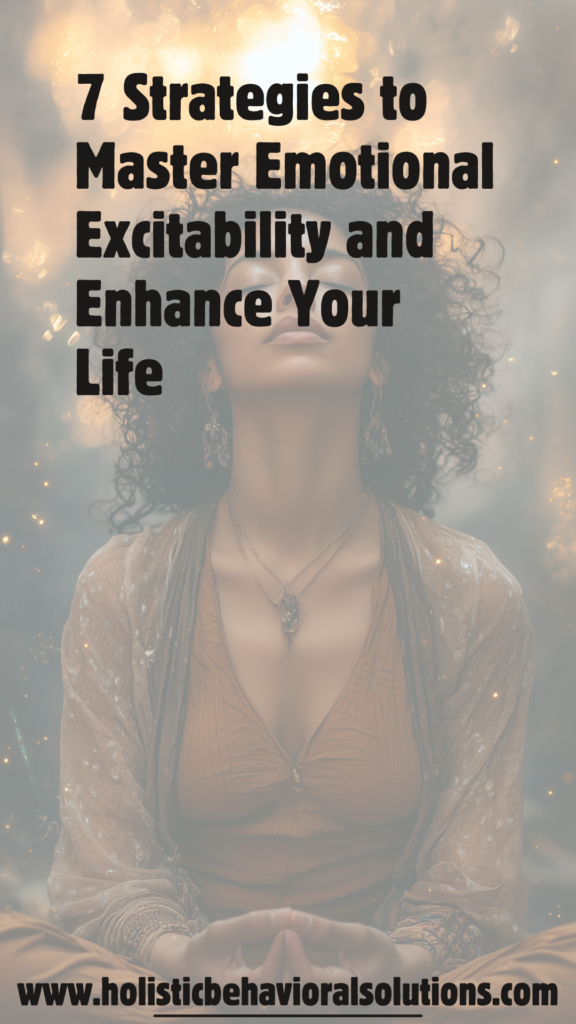
Emotional excitability refers to a heightened sensitivity and reactivity to emotional experiences. Individuals who experience this often feel emotions—both positive and negative—with great intensity and urgency. While this can fuel creativity, empathy, and connection, it can also create challenges in relationships, daily functioning, and overall mental health.
Let’s explore what emotional excitability is, what causes it, and how to manage it in ways that empower rather than overwhelm.
What Is Emotional Excitability?
Emotional excitability describes an intensified emotional responsiveness. Someone who is emotionally excitable may:
- React strongly to minor events
- Feel joy or sadness more deeply than others
- Experience emotional highs and lows more frequently
This vivid inner experience can make life feel more meaningful—but also more volatile.
Causes of Emotional Excitability
Several overlapping factors can contribute:
1. Genetics
Certain genes, such as those affecting serotonin transport, are linked to increased emotional sensitivity. These biological predispositions influence how the brain processes emotions.
2. Early Experiences
Childhood trauma, neglect, or growing up in high-stress environments can prime the nervous system for reactivity. These patterns often persist into adulthood.
3. Mental Health Conditions
Emotional excitability is frequently seen in conditions like:
- Borderline Personality Disorder (BPD)
- Bipolar Disorder
- Anxiety Disorders
In these cases, managing underlying conditions can reduce emotional intensity.
The Double-Edged Sword: Benefits and Challenges
Strengths of Emotional Excitability
- Creative Drive: Intensity can inspire powerful artistic or intellectual output.
- Deep Empathy: Feeling things strongly can lead to greater compassion and relational depth.
- Heightened Awareness: Emotionally sensitive individuals often pick up on subtle cues in others.
Challenges That May Arise
- Emotional Overwhelm: High reactivity can lead to anxiety, stress, and emotional fatigue.
- Strained Relationships: Loved ones may struggle to keep pace with mood fluctuations.
- Mental Health Risks: When unmanaged, emotional intensity can lead to depression, burnout, or difficulty with emotion regulation.
Coping Strategies That Help
Managing emotional excitability doesn’t mean dulling emotions—it means creating space for emotional clarity, regulation, and choice.
1. Mindfulness & Meditation
Grounding practices like mindfulness help you observe emotions without immediately reacting. With practice, you learn to respond rather than react.
2. Breathwork Techniques
Box breathing or alternate nostril breathing can reset your nervous system in moments of overwhelm. These simple tools remind you that your breath can bring you back to center.
Explore: Breathwork Practices for Stress Relief
3. Cognitive Behavioral Therapy (CBT)
CBT helps you identify thought patterns that trigger intense emotional responses. By reframing these thoughts, you can shift your emotional experience over time.
4. Self-Compassion
Meeting yourself with kindness builds resilience. Practicing self-compassion quiets inner criticism and makes space for growth, healing, and grace—both for yourself and those around you.
Explore: The Power of Self-Compassion in Wellness
5. Lifestyle Balance
- Prioritize sleep, movement, and balanced nutrition
- Limit stimulants like caffeine and screen time
- Build restorative routines to support emotional health
6. Strong Support System
Surround yourself with friends, family, mentors, or therapists who validate your emotions and help you regulate during difficult moments.
7. Creative Expression
Creative outlets—art, music, journaling—can transform emotional intensity into something beautiful and meaningful. It’s not about suppressing feelings but expressing them in constructive ways.
Embracing Emotional Excitability
Emotional excitability isn’t a flaw—it’s a temperament trait. With the right strategies, you can harness its power rather than be consumed by it. You don’t have to trade your sensitivity for peace—you can have both.
Support Your Emotional Wellness with Holistic Supplements
Your emotional balance deserves holistic support. Visit our Holistic Supplement Store for carefully selected products designed to enhance mental clarity, reduce stress, and support mood. These wellness tools can complement your emotional wellness journey—naturally and effectively.
PS: Are you a culturally competent licensed clinician passionate about guiding others toward resilience? Our practice is growing, and we’re hiring in New Jersey! Check out our Careers page for current openings and join a team dedicated to fostering impactful, inclusive mental health support.

